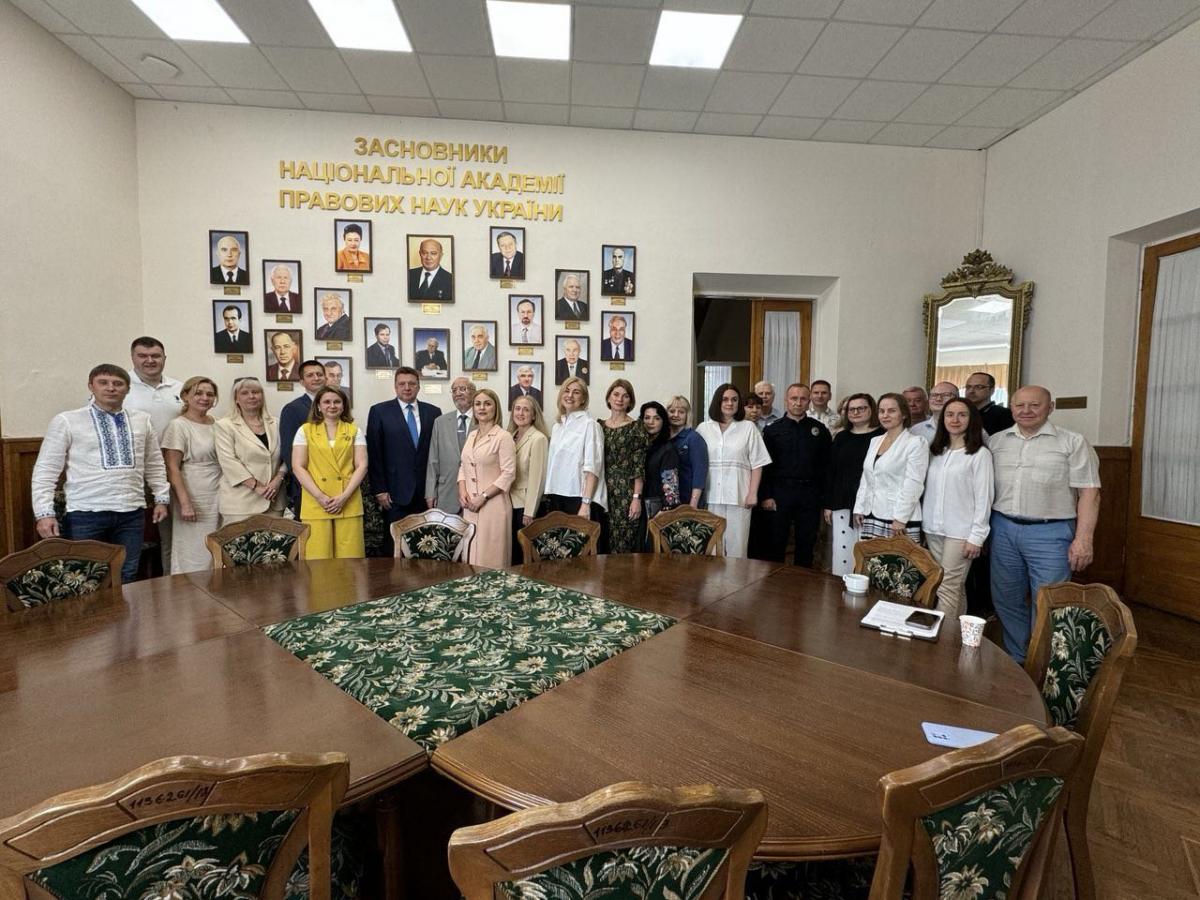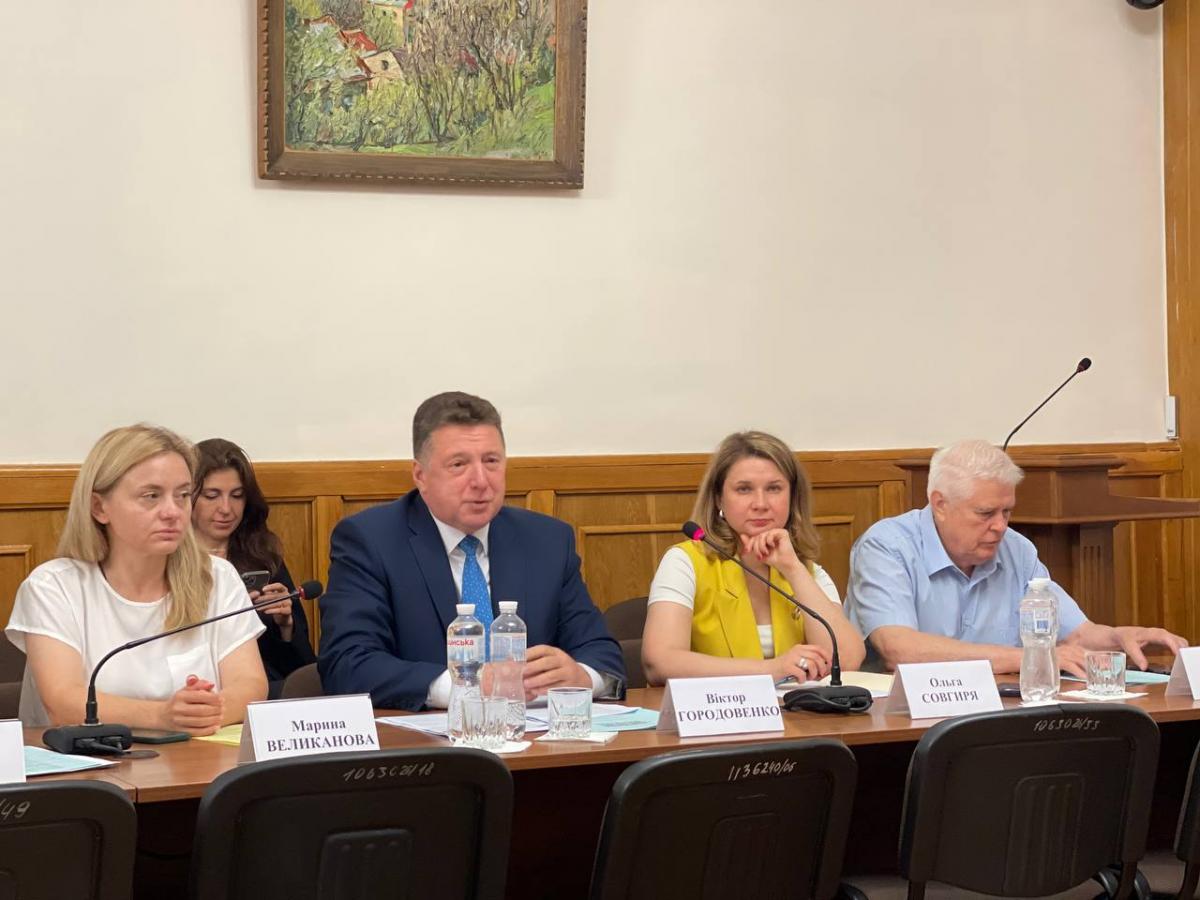On June 25, 2024, Judges of the Constitutional Court of Ukraine Viktor Gorodovenko and Olga Sovgyria participated in the All-Ukrainian Scientific and Practical Conference “Legal Support for the Transformation of Public Bodies for the Restoration of Ukraine”.
The event, organised by the Institute of Lawmaking and Scientific-Legal Expertises of National Academy of Sciences of Ukraine on the occasion of the 28th anniversary of the adoption of the Constitution of Ukraine, brought together a wide range of scholars, judges, and representatives of public bodies.
The conference was opened by Professor Oleksiy Kot, Director of the Institute of Lawmaking and Scientific-Legal Expertises of National Academy of Sciences of Ukraine. In his speech, he noted that today’s conditions require adjusting the functional focus of public bodies in accordance with the peculiarities of the martial law regime. He emphasised that the drawing-up and introduction of amendments of the Constitution of Ukraine and other legislative acts requires scientific and professional opinion, a comprehensive approach with professional discussion of public and scientific issues, which is, in fact, the subject of this conference.
Judge Viktor Gorodovenko spoke about the application of the principle of good governance in the jurisprudence of the Constitutional Court of Ukraine.
He drew attention to the fact that in 2022 and 2023 the Constitutional Court of Ukraine, summarising the application of the principle of good governance in the constitutional doctrine, stated that in order to comply with the requirements of the Constitution of Ukraine, the state must implement in its activities the constitutional principle of its responsibility to the individual and the principle of good governance, which is essentially related to it, and which consists in the obligation of the state to implement in its activities the fundamental principles of building, organising and exercising state power to establish a true democracy, ensure human rights and the rule of law as the common European values.
In his speech, Viktor Gorodovenko noted that the Constitutional Court of Ukraine fills the principle of “good governance” with its own constitutional and legal vision and constitutional spirit. The judge also spoke about the practice of applying this principle by the Constitutional Court of Ukraine, in particular, he drew attention to the Court's Decision No. 3-r(I)/2019 dated June 5, 2019. In this Decision, the Court emphasised the importance of the principle of “good governance”, noting that when it comes to matters of general interest, in particular, if the case affects fundamental human rights such as property rights, public authorities must act in a timely manner and in an appropriate and as consistent manner as possible; public authorities are obliged to introduce internal procedures that will enhance the transparency and clarity of their actions, minimise the risk of errors and promote legal certainty in civil legal relations affecting property interests.
In addition, the Court's Decision No. 9-r(II)/2022 dated November 16, 2022 states that the implementation of the principle of “good governance” is the obligation of the state to implement in its activities the fundamental principles of building, organising and exercising state power to establish a true democracy, ensure human rights and the rule of law as the common European values.
Viktor Gorodovenko concluded that one of the essential features of the principle of “good governance”, formed by the constitutional and legal doctrine, is the obligation of the state to implement in its activities the fundamental principles of building, organising and exercising state power to establish a true democracy, ensure human rights and the rule of law as the common European values.
Judge of the Court Olga Sovgyria spoke about the activities of the Constitutional Court of Ukraine under martial law.
She emphasised that after February 24, 2022, each state body faced the specifics of operating under martial law. However, despite all the difficulties of the war, the public authorities were able to concentrate all their efforts on repelling the enemy. The judge stressed that since the beginning of the full-scale invasion, the Constitutional Court of Ukraine has experienced the specifics of its activities under martial law: this applies to both organisational changes, in particular, deliberation of cases mainly in written proceedings, and the forced tendency to postpone the expiration of the provisions of legal acts declared unconstitutional.
The judge noted that in its decisions, the Court has developed many positions directly or indirectly aimed at protecting the sovereignty and territorial integrity of Ukraine, in particular, ensuring social protection of Ukrainian citizens serving in the Armed Forces of Ukraine and other military formations.
In her speech, Olga Sovgyria analysed in detail a number of the Court's decisions that were delivered before the full-scale invasion, but were already related to the armed aggression of the Russian Federation against Ukraine, as well as those delivered after February 24, 2022. She focused on the key legal positions of the Court, which to some extent relate to Russia's armed aggression against Ukraine: the decisions of the Constitutional Court of Ukraine No. 9-r/2019 dated July 16, 2019, No. 3-r/2021 dated December 21, 2021, No. 1-r(II)/2022 dated April 6, 2022, No. 7-r(II)/2022 dated October 12, 2022, No. 4-r/2022 dated December 27, 2022, No. 3-r/2022 dated December 23, 2022, No. 11-r(II)/2023 dated December 20, 2023.
The event was also attended by Professor Mykhailo Kostytskyi, a former judge of the Constitutional Court of Ukraine, Chief Researcher of the Private Law Research Department of the Institute of Lawmaking and Scientific-Legal Expertises of National Academy of Sciences of Ukraine, who delivered a presentation on “Public Authority in Ukraine and its Institutional Capacity during Martial Law and Post-War Reconstruction”.
In his speech, he focused on the theoretical aspects of the concept of “public authority” in jurisprudence, political science, philosophy and its features. The speaker outlined the types of public power as the power of the people, which is exercised in the course of social change, in referendums, elections to public authorities, etc.
Mykhailo Kostytskyi also focused on the concept of “institutionalisation’, which in its initial form emerges in civil society and, with development, leads to the formation of institutions in civil society and the state. He emphasised that any public authority must be legitimised, and it is through legitimacy that authorities are able to act. The professor also expressed his views on the principle of the rule of law.
The event was moderated by Andrii Hryniak, Deputy Director for Research at the Institute of Lawmaking and Scientific-Legal Expertises of National Academy of Sciences of Ukraine.
The conference materials are available at: abstracts of the participants' reports.



